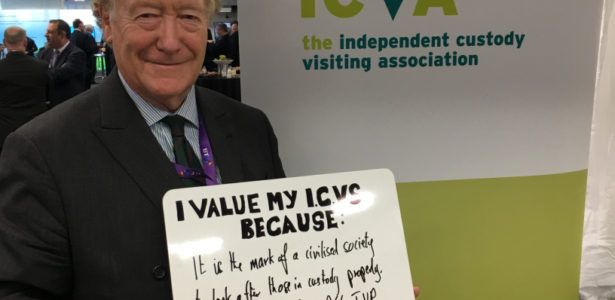Celebrating fair and dignified detention

A recent episode of “24 Hours in Police Custody” broadcast a murder investigation, including the early arrest of a detainee. Whereas he initially appeared to be a credible suspect, CCTV soon cleared his name. It’s easy to assume that people in police custody have done something wrong, but imagine if you were in that position – locked up, alone, without your personal belongings, friends or family. How would you feel?
Fortunately, in the UK, we have rights and entitlements that embed fairness into our criminal justice system.
Independent custody visiting is an incredible service that I am proud to lead. The Scarman Report, following the riots of the early 1980s, planted the seeds of this service to prevent harm and reassure the public that police custody was a safe place for anyone in it. Life has moved on considerably since those days.
Police custody is no longer the ‘closed shop’ that it was when custody visiting was established in the 1980s. CCTV is ubiquitous across suites and detainees will see Appropriate Adults, solicitors and healthcare professionals all looking out for different elements of their wellbeing. However, Independent Custody Visitors (ICVs) have a unique role in this area. ICVs are local volunteers in place to make unannounced visits to police custody where they will speak to detainees, look at custody records that document their stays and report on their rights, entitlements and wellbeing. They will also look at, and report on, the general condition of custody. ICVs will visit police custody any time of the day or night – with some visits targeted to coincide with major events and others taking place over night hours and weekends. Specially trained ICVs will visit those arrested under terrorism legislation – a hugely important tool in a high pressure area.
What does this look like in a custody suite? ICVs will make their visits, and report issues back to their local scheme manager. The reports will outline problems and challenges that can be resolved locally or nationally. A typical local issue can be as simple as ensuring that detainees are given leaflets explaining their rights, enough blankets to stay warm or that custody suites are kept safe and in a good state of repair. These issues are often resolved by the ICV at the time or the scheme manager after the visit.
ICVA supports schemes and volunteers in a number of ways. We develop training and guidance that keeps them up to date. We may advise schemes of changes to legislation or practice, guiding them on what they should look for and report on. Each training module is specifically for the ICV perspective. For example, we have developed training on mental health in police custody – outlining changes in legislation, what to look for and what constitutes good or poor custody. We also support schemes following an inspection, providing them with bespoke reports and phone calls or meetings where we highlight particularly good or worrying findings for schemes to follow up. We will look at thematic issues across police custody, recently exploring detainee dignity, clothing and nudity in police custody. We sent individual letters to each PCC, summarising local concerns where they exist, complementing this with additional guidance and hints and tips for ICVs and scheme managers. Several PCCs have been in touch with our Chair to outline their plans to implement additional scrutiny and reviews on this topic, all contributing to the PCC role and police authority role that holds the police to account.
ICVA also responds to national issues where we feel there is room for improvement. ICVs ask every detainee whether they have received their basic rights to legal advice, to let someone know they are there and to read the ‘rulebook’ of detention. I am so proud to say that I have never seen any problems relating to these basic rights. Much of our work relates to ongoing dignity of detainees.
Earlier this year we received national coverage on our work to improve menstrual care in police custody. In sharing ICV feedback, which outlined some poor care and poor products, the National Police Chiefs’ Council has developed new operational guidance and the Home Office is reviewing statutory Codes of Practice. Moreover, our local scheme managers are reporting improved care for female detainees, lifting of tampon bans and storing real (rather than paper) knickers for detainee use. This may seem like a minor change at first glance, but it creates real change to the dignity of detainees. We have also raised concerns on oversight of voluntary interviews, delays in accessing mental health care and treatment of detainees. Those in power are now running projects on all of these areas, based on feedback from ICVs.
We are proud to work alongside organisations like the National Police Chiefs’ Council, the Home Office, the UKNPM and the Association of Police and Crime Commissioners. We know, from our time on the ground with police custody staff, and from our work with senior officers, that we all share a common goal to ensure that police custody is safe, fair and dignified. ICVs are one piece of huge network of people looking out for detainee welfare and we are proud to deliver a detainee voice.
Times change and we cannot afford to be complacent. Independent custody visiting is not immune from challenge, and neither should it be. We are conducting work to ensure that we are transparent and we want to communicate more. Custody has changed. We deeply value speaking to detainees in situ, but this is not the only way that the public can oversee police custody. We are supporting a local pilot that is scrutinising the complete custody records of vulnerable detainees. This type of oversight gives a whole new angle to ICVs’ work and empowers local PCCs / police authorities to take evidence to partner organisations and provide holistic, timely care for vulnerable people. This work is exciting, I love it and I am confident that it will bring wider improvements.
I opened this blog by discussing an innocent detainee and asking you to put yourself in their shoes, but what if the detainee is guilty? I, and ICVs, do not know or care if this is the case. Independent custody visiting represents human rights in a very pure form: ICVs, and indeed ICVA, regularly promote the rights of people who are later found guilty, who have done some terrible things or ended up in awful messes. This is both necessary and desirable. Because we can’t differentiate can we? If we want a fair system and a civil society then human rights must be afforded to every single person, regardless of how they have lived. If we take away legal advice from someone because we expect that they are guilty, we lose fair trials and justice. More that that, we are all humans and we all deserve a certain standard of treatment. Police custody should not be punitive, detainees must leave (whether to go home or to court) having been treated with fairness, dignity and safety.
Read the original article here: https://custodyvisiting.wordpress.com/2018/06/19/533/
